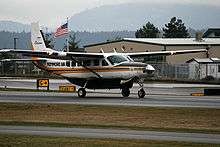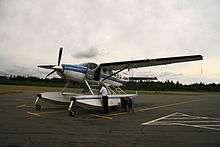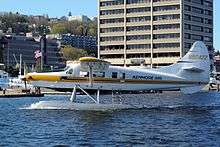Kenmore Air
 | |||||||
| |||||||
| Founded | 1946 | ||||||
|---|---|---|---|---|---|---|---|
| AOC # | GJRA163A[1] | ||||||
| Hubs | |||||||
| Fleet size | 24 | ||||||
| Destinations | Olympic Peninsula, San Juan Islands, Canadian Gulf Islands, Victoria, BC and BC's Inside Passage | ||||||
| Company slogan | Flying the Pacific Northwest Since 1946 | ||||||
| Parent company | Kenmore Air Harbor, Inc. | ||||||
| Headquarters |
Kenmore Air Harbor Kenmore, Washington, USA | ||||||
| Key people |
| ||||||
| Website | KenmoreAir.com | ||||||
Kenmore Air Harbor, Inc., doing business as Kenmore Air, is an American airline with its headquarters on the grounds of Kenmore Air Harbor in Kenmore, Washington, USA, north of Seattle.[2][3] It operates scheduled and charter seaplane and land plane service to destinations throughout western Washington and southwestern British Columbia, as well as seaplane "flightseeing" flights around Seattle. In addition to its corporate headquarters, seaplane maintenance facility and terminal in Kenmore, the airline has hub operations for seaplanes at its terminal on Seattle's Lake Union and for land planes at Seattle's Boeing Field/King County International Airport. It also operates a maintenance facility for its land plane fleet at Renton Municipal Airport/Clayton Scott Field in Renton, Washington, just south of Seattle.[4]
History
Early history
The airline was established and started operations on March 21, 1946. It was founded by Robert Munro, Reginald Collins and Jack Mines and began operations with a single Aeronca Model K seaplane and a hangar at a location formerly occupied by a lumber mill on north Lake Washington. The airline is still at its original location. After a short term partnership Munro continued alone with the company until his death in October 2000.[4][5]
The company was originally named Mines Collins Munro but was changed to the current name Kenmore Air a few months later to reflect its ties to the town of Kenmore, Washington where its operations were located both then and now. After beginning operations with its Aeronca Model K, it purchased three more aircraft a few weeks later.[5]
Kenmore Air originally made its money by accessing remote and sometimes dangerous locations during its early years. In July 1946, pilot Jack Mines was killed while flying supplies to a search and rescue team in the nearby Cascade mountains; as a result, Collins and Munro became the two owners of Kenmore Air. Munro soon became the sole owner of Kenmore Air when Collins moved to California after accepting a job there.[5]
From the start, Kenmore Air's seaplane maintenance and restoration service was an important part of the company. In the late-1940s, Kenmore Air became a Republic Seabee dealer for the Northwest and this became a success for Kenmore Air. At one point, 40 Seabees were based at Kenmore Air Harbor, though Kenmore Air themselves owned just one of these amphibian aircraft. Kenmore became experts in maintenance and repair of the aircraft and developed several modifications to improve the aircraft's performance.[6] Kenmore Air also became an official aircraft and parts dealer for Cessna by the end of the 1950s, further expanding its aircraft maintenance business.[5][7]
1950s
In the 1950s, Kenmore Air began its charter business by offering flights to fishing and hunting spots in the Pacific Northwest. Kenmore Air also leased an aircraft to the US government for survey flights in Alaska. This led to a series of contracts with the US Navy which continues today. In 1953, a Canadian mining company hired Kenmore to help fly in equipment and tools to build a mining camp on Leduc Glacier, fifty miles north of Ketchikan, Alaska. Kenmore Air used two Noorduyn Norseman and a Seabee to fly in equipment over a two-month period. The aircraft flew in several pieces of large equipment to the glacier, including diesel engines, railroad cars, and tractors.[5][7]
1960s
In the 1960s, Kenmore Air expanded its maintenance services to include the de Havilland Canada DHC-2 Beaver seaplane. They purchased their first Beaver in 1963 and the Beaver soon became a centerpiece of Kenmore Air's fleet, and they created a rebuilding and modification program around the seven-passenger aircraft. After the Beaver ceased production in 1967, Kenmore Air began to establish themselves as a leading refurbisher of the seaplane. They modified and rebuilt Beavers to such an extent that such aircraft modified by the company have become known as "Kenmore Beavers" by the global aviation community.[5] Kenmore Air has rebuilt a total of 125 Beavers since then. To accommodate their expansion, the company built a new hangar and office building during the 1960s.[8]
1970s
In the early 1970s, in a contract with the US Navy, Kenmore Air transported unarmed torpedoes to a joint US-Canadian testing facility near Vancouver Island.[5] For five years during this decade, Kenmore Air transported scientists and supplies to a glacier on Mount Olympus, in which the seaplanes had to takeoff and land on a glacier 6,500 feet above sea level. The airline also expanded its charter service in the 1970s, offering round-trip flights to fishing resorts in British Columbia.[9]
1980s
In the mid-1980s Kenmore Air purchased Otter Air, an airline that offered seaplane service from Seattle to Victoria, BC. The Seattle-Victoria route was operated for two years before it was sold to their competitor Lake Union Air in 1988. Kenmore Air also added two Turbo Beavers (a modified Beaver with its radial engine replaced with a turboprop engine) in the late 1980s, and purchased their main competitor Lake Union Air in 1992. With this purchase, Kenmore Air acquired a seaplane terminal on Lake Union. They converted one of Lake Union Air's de Havilland Canada DHC-3 Otters into a Turbo Otter and later purchased several more Turbo Otters.[5]
1990s

In 1997, Kenmore Air planned to begin operating service from Elliott Bay, a body of water on Puget Sound where Seattle's downtown waterfront is located. In 1998, Kenmore Air gained a federal permit allowing them to begin operations there, pending approval from Seattle's city council. The company later abandoned their plans in fall 1999 after encountering resistance from members of the local community.
2000s
In October 2000, Robert Munro, the company's founder and owner, died at age 83 after an extended illness. Ownership was passed to Munro's son, Gregg Munro, while several other family members, also held management positions at Kenmore Air.[5]
2010s
Residents in both Seattle near their Lake Union seaport [10] and in Victoria have been growing increasingly concerned about noise and safety on the water. In Sept 2011 Victoria the St. James Community commissioned a report [11] that calls for "serious restrictions" on seaplane businesses" (which include other services like helicopters). Kenmore Air has responded by encouraging their pilots to follow limited flight paths in Seattle [12] In 2013 when new high rise condos were proposed by Vulcan in South Lake Union neighborhood, Kenmore requested that an easement be placed on new residents to prevent them from filing noise complaints.
Destinations


Daily, year-round seaplane service is provided from Seattle's Lake Union to Lopez Island, Orcas Island and San Juan Island in Washington State, as well as to Victoria, BC. Limited year-round service is also provided from Lake Union to the Canadian Gulf Islands and the Saanich Peninsula. Seasonally (May–September), daily seaplane service is provided from Kenmore Air Harbor to more than 30 destinations in British Columbia, including Big Bay, Campbell River, Cortes Island, Desolation Sound, Nanaimo, Port Hardy, Port McNeill, Quadra Island, the Sechelt Peninsula, Sonora Island, and Refuge Cove.
In January 2014, Kenmore Air announced a regular commercial service between Nanaimo Airport and Boeing Field in Seattle, with a free shuttle between Boeing Field and Sea-Tac. The service started March 3, 2014, but was discontinued on May 4, 2015 due to low passenger numbers.[13]
Kenmore Air Express provides daily, year-round service to the Washington communities of Eastsound and Friday Harbor. Service to Port Angeles was discontinued in November 2014.[14]
Fleet
As of June, 2016, the Kenmore Air fleet contains 25 aircraft.
| Aircraft | In Service | Passengers | Notes |
|---|---|---|---|
| DHC-2 Beaver | 8 | 6 | |
| DHC-2 Turbine Beaver | 2 | 7 | |
| DHC-3 Turbine Otter | 9 | 10 | |
| Cessna 180 | 2 | 2 | |
| Piper Super Cub | 2 | 1 | One Piper PA-18 and one Cub Crafters PA-18, both used solely for flight training purposes. |
| Cessna 208 Caravan | 1 | 8 | Equipped with wheels and operated under Kenmore Air Express Brand. |
| Cessna 208 Grand Caravan | 2 | 9 | Two aircraft equipped with wheels, both operated under Kenmore Air Express Brand |
| Total | 25 |
Special Liveries
Kenmore Air has three aircraft painted in special liveries:
- N57576, a DHC-2 Beaver, painted as "Rocky's Flying Beaver",
- N50KA, a DHC-3 Turbine Otter, Painted in Evening Magazine promotional livery
- N606KA, a DHC-3 Turbine Otter painted in Wild Orca livery
Incidents and accidents
- October 1, 1977: A Kenmore Air DHC-2 Beaver crashed after colliding with terrain near Stevens Pass, Washington, killing all seven occupants. The aircraft crashed while heading to Lake Hatheume, British Columbia, after departing from Kenmore, Washington. The incident marked Kenmore Air's first fatal crash in over 36 years of operation. The crash, attributed to the overloading the aircraft's payload capacity and the aircraft's inability to climb above the rising terrain. Originally written off as damaged beyond repair, the DHC-2 Beaver, registered as N64391, was restored, and reregistered as N62357.
- June 11, 1979: A Kenmore Air DHC-2 Beaver was damaged beyond repair after it crashed at sea near Maurelle Island, British Columbia, killing the sole occupant. The aircraft, registered N68084, was later recovered, repaired and reregistered as N72TT.
- October 1, 1999: Exactly 22 years after the first Kenmore Air fatal accident, a Kenmore Air DHC-2 Beaver crashed in a wooded area near Port Blakely, Washington. The aircraft, registered as N9766Z, was carrying four passengers, all members of a BBC film crew. The pilot and four passengers all received minor injuries, and the aircraft returned to service. The cause of the accident was attributed to the pilot's failure to maintain proper clearance above the trees and terrain.
- September 30, 2016: After departing from Seattle's South Lake Union a Kenmore Air DHC-2 Beaver crashed in the waters near San Juan Islands at approximately 8:50a.m. A husband and wife in a pleasure boat, the Northern Rose, were able to make it to the crash scene and pulled one woman and three men on board from the water. All four victims were treated for minor injuries and hypothermia and discharged.
In popular culture
Microsoft Flight Simulator X
Kenmore Air's DHC-2 Beaver N9866Z appears in the mission "San Juan Island Run" in Microsoft Flight Simulator X. Kenmore Air's livery also appears in Microsoft Flight Simulator X on the Cessna 208 Caravan and de Havilland Canada DHC-2 Beaver.
Infinite Flight
Kenmore's livery also appears in the popular mobile flight simulator Infinite Flight on the C208.
See also
References
- ↑ "Federal Aviation Administration".
- ↑ "Terminals." Kenmore Air. Retrieved on July 18, 2010.
- ↑ "Company Contact Info." Kenmore Air. Retrieved on July 18, 2010.
- 1 2 "Directory: World Airlines". Flight International. 2007-04-03. p. 100.
- 1 2 3 4 5 6 7 8 9 "Kenmore Air Harbor Inc. -- Company History". Funding Universe. Retrieved 31 December 2011.
- ↑ "Kenmore Air History -- 1940s". Kenmore Air. Archived from the original on 26 December 2010. Retrieved 31 December 2011.
- 1 2 "Kenmore Air History -- 1950s". Kenmore Air. Archived from the original on 25 August 2011. Retrieved 31 December 2011.
- ↑ "Kenmore Air History -- 1960s". Kenmore Air. Archived from the original on 9 August 2011. Retrieved 31 December 2011.
- ↑ "Kenmore Air History -- 1970s". Kenmore Air. Archived from the original on 30 August 2011. Retrieved 31 December 2011.
- ↑ Oregonian Jan 21 2013
- ↑ Aerodrome Noise, Emissions & Safety Victoria Harbour
- ↑ https://sites.google.com/site/wa0spa/noise-abatement
- ↑ "Kenmore Air suspends service to Nanaimo Airport". Nanaimo News Bulletin. April 24, 2015. Retrieved May 10, 2015.
- ↑ "Kenmore Air to drop Port Angeles service mid-November". Peninsula Daily News. October 31, 2014. Retrieved April 23, 2015.
External links
| Wikimedia Commons has media related to Kenmore Air. |
